How empathy in changemaking can transform institutions
UC Berkeley business school faculty member Alex Budak’s changemaking ethos has inspired students on campus. His new book aims to do the same for others.
October 27, 2022
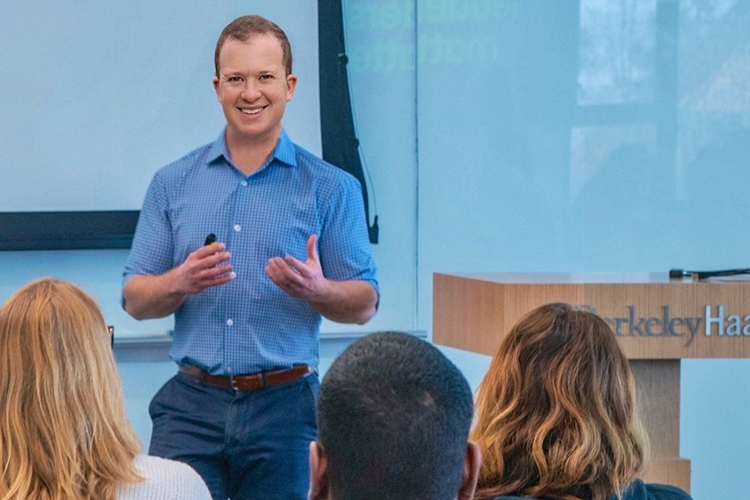
UC Berkeley business school faculty member Alex Budak’s changemaking ethos has inspired students on campus. His new book aims to do the same for others. (Photo courtesy of Alex Budak)
The Berkeley Changemaker is a Berkeley News series highlighting innovative members of the campus community engaged in work and research that tackles society’s most pressing issues.
Playing soccer in a dirt field in Ahmedabad, India, Alex Budak discovered his calling.
As a public policy graduate student studying abroad in summer 2009, Budak volunteered to support a local girls sports club and witnessed the positive impact that one small group of people could have.
“The local founders were developing leaders and helped create a powerful feeling of community,” said Budak. “And for the first time, I could see that change doesn’t just come from big institutions where policies are made. There is an immense world of people — of changemakers — who want to do good.”

Budak said he has since been “obsessed” with empowering others to step into their changemaking potential. In 2010, he co-founded the nonprofit StartSomeGood, a social impact crowdfunding platform that has helped thousands of changemakers in over 50 countries raise more than $10 million to fund and scale social ventures that serve the greater good.
As a UC Berkeley Haas School of Business faculty member, Budak, since 2019, has used his experiences as a social entrepreneur to teach his course, Becoming a Changemaker, to undergraduate and graduate students. He also serves as a core faculty member for The Berkeley Changemaker Gateway Course, part of the campus-wide Berkeley Changemaker initiative.
Budak’s class and teaching has also inspired the creation of Berkeley startups and nonprofits that buck the status quo.
Budak’s new book, Becoming a Changemaker: An Actionable, Inclusive Guide to Leading Positive Change At Any Level, is a research-backed guide that breaks down the changemaking ethos he shares with his students.
Berkeley News recently spoke with Budak about the importance of having empathy as a changemaker, and why Berkeley is becoming a leader in the field of changemaking.

Over the years, Budak has inspired students to be changemakers through his Berkeley Haas course. (Photo courtesy of Alex Budak)
Berkeley News: This idea of changemaking can be somewhat foreign to some people. What is a changemaker?
Alex Budak: I define a changemaker as someone who leads positive change from wherever they are. So, I’m radically inclusive in that definition.
There’s no mention of roles or titles. I think being actionable and inclusive are really the beating hearts of changemaking. Fundamentally, all people want to feel included and have a sense of belonging in whatever they are doing or wherever they are.
We’re in such a hurry to rebuild the roads we are traveling, but we need to actually stop and question what roads we should be rebuilding.”
– Muhammad Yunus
So, I believe that a Nobel Prize winner has just as much claim to being a changemaker as an entry level product manager. In my book, I tell over 50 different stories of people from all walks of life. From a Walmart sales associate, to the CEO of a Fortune 500 company, and even to a guy who’s just really passionate about composting and wanted to transform his whole company’s sustainability policies.
This book is radically inclusive, and it’s a guide for everyone. That’s really important to me because I believe everyone can be a changemaker, wherever they are on their journey.
It seems like your changemaking ethos is really driven by certain values. Where does that come from?

Budak with his fifth-grade teacher, Mrs. Scott, during his elementary school graduation. “She was one of my greatest inspirations,” he said. (Photo courtesy of Alex Budak)
Well, I was born in Palo Alto and grew up surrounded by the entrepreneurial atmosphere of Silicon Valley. So, at a young age, that really helped me to develop the ability to think outside of the box. But with that came the pressure to achieve in an environment that had very warped definitions of success.
But for better or for worse, I’ve always had a very clear sense of values and always felt really strongly about justice and inclusivity. In high school, if there was one kid sitting by themselves, I wanted to bring that kid into our group.
My parents also often joke about how, even when I was a little kid growing up, I always tried to spend equal time with all of my stuffed animals.
So, those values really impact the core of my teachings and work.
There seems to also be a sense of empathy that comes through in your book and in how you teach your course. How important is having empathy, for a changemaker?
It’s crucially important because we’ve got to be able to put ourselves in the shoes of those that we seek to work with. Whether that’s to find common ground or just to understand how others perceive change.
So, I can say that empathy absolutely is one of the cornerstones of a changemaker mindset.

As a graduate student at Georgetown University, Budak supported grassroots change efforts at a local girls sports club in Ahmedabad, India. That work inspired him to become a social entrepreneur, he said. (Photo courtesy of Alex Budak)
Do you think empathy can be taught?
It 100% can be taught.
Although first, we should recognize some of the downsides and traps of empathy. For instance, the research does show that people tend to more easily be empathetic to people who look like them or have similar backgrounds, which can have terrible implications for leading change.
But in my class, I’ll have my students go through a recent situation that really frustrated them. Maybe someone cut you off driving to school, and you make assumptions about them. That they’re a jerk, that they’re entitled and other negative characterizations.
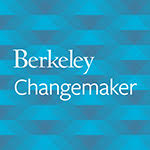
Berkeley News is highlighting innovators on campus that bring societal benefit through work and research.
Is all of that necessarily true? No. These are just reactions and projections to what has just happened to us.
So, with my students, we really try to put ourselves in the other person’s shoes. Maybe the person who cut you off was rushing to the hospital because their wife was about to give birth. Or maybe they’re rushing to pick up their kid from school — who knows?
We can use that as a thought exercise to remind us that our own perceptions are not always right.
We’ve got to understand where other people are coming from, as well, because when we lack information, it’s so easy to make up stories. And we tend to make ourselves both the hero and the victims of our own story.
That is why it is so important to get out of those social bubbles that we have and actually get to know people that we seek to work with or understand.
But how does having empathy impact making change?
There is a connection between empathy and the ability for institutions, systems and policies to change. For example, someone may often look at a negative or painful work experience with their boss and think that’s just how the system works, or that’s how corporate America works. And just accept it.
But it takes being willing to question the system and also having the empathy to say, “That was really terrible for me, when I had to endure that arrogant boss. I’m going to make sure I don’t do the same thing when I’m a boss because I know what it’s like.”
So, having that empathy allows us to develop as people and to become the type of leaders we wish we had. And those types of changes can fundamentally transform work atmospheres, systems and institutions at their core.

Budak has modeled his changemaking through his leadership on campus. Here, he teaches an executive education course for Berkeley’s Executive Program in Management. (Photo courtesy of Alex Budak)
Do you find there is a culture shift happening in our institutions and structures because of an increase in changemaking?
We have definitely experienced very fortuitous timing in the past few years where a bunch of trends are all coming together right now.
This is a moment for changemaking.
The great resignation and the pandemic, among other things, caused people to question almost every aspect of their lives. I think in so many ways we were on autopilot, and we have awoken to a lot of our toxic habits.
I had Nobel Prize winner Muhammad Yunus talk to my class in the middle of COVID, and he said, “We’re in such a hurry to rebuild the roads we are traveling, but we need to actually stop and question what roads we should be rebuilding.”
I’ve really taken that to heart.
And I think a number of people are asking those questions. There’s a realization that what we do is not just about money, and that we’re also thinking about the impact we’re going to leave behind in our lives.
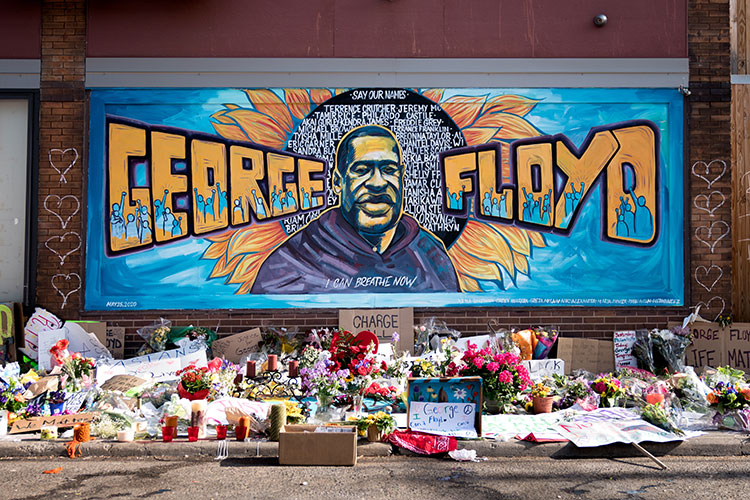
A mural honors George Floyd near the site of his death in Minneapolis, Minn. Budak said the increasing awareness around systemic racism is a real moment for changemaking. (Photo by Lorie Shaull via Flickr)
We also have an increasing awareness of some of the issues around systemic racism — that’s not a new thing and has been in our society forever — but finally there has been a long overdue awakening to it.
The climate crisis facing us, and climate justice, is a key issue we’re becoming more aware, of as well. And then, meanwhile, we also have Gen Z stepping into the workforce during this unprecedented time.
A recent World Economic Forum study found that 77% of Gen Z want to work for a company that shares their values and that prioritizes social impact.
So, I think all those trends have led to many of us wanting to have a greater sense of agency in our life and ability to actually shape not just our own lives, but also the future of the next generation. And that’s a really healthy thing.
For someone who says they don’t care about the next generation, how do you make them care about being a changemaker?
COVID taught us that so many of the things we had taken for granted — stable jobs, stable industries — can get turned on their heads.
And so, even if things seem comfortable now and fine financially, in order to stay futureproof, it’s really important that you become better able to navigate and steer changes.
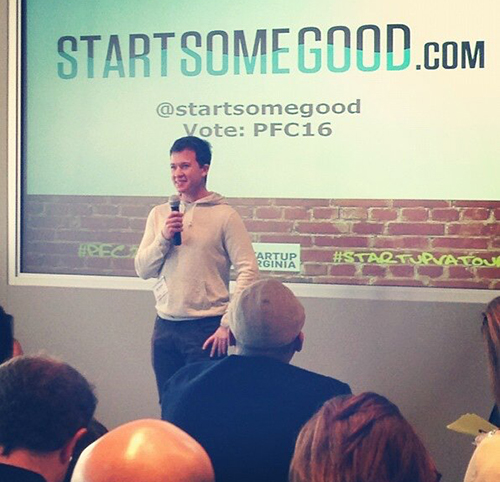
This photo shows one of the first times Budak ever pitched the concept of his crowdfunding platform StartSomeGood. (Photo courtesy of Alex Budak)
In the book, I tell the story about Two Birds Brewery, which is the first-ever woman-owned brewery in Australia. And they have a legacy of questioning the status quo in the way that they run everything. So, when COVID hit, and all restaurants went on lockdown, and everyone’s trying to figure out their digital strategy, this company was already at the leading edge.
They were able to adjust really nimbly, and within a weekend, they had set up a drive-through bottle shop and set up deliveries, and they were ready to go. So, caring about changemaking is almost like developing muscles to be able to shift and make those changes.
And change is constant.
So, even if it’s just about self-preservation, it’s still in your interest to become a changemaker because you’ve got to be able to handle change.
I hope that this book can be a way to give people some of the tools they need to not just be aspirational as changemakers, but actually feel that they’re equipped to go through that change.
And why decide to write the book on this?
I’m a reluctant author, I would say. To be honest, I didn’t set out to write the book, but I had enough students who told me that the changemaker course they took was life-changing for them, and that they wanted me to write a book.
And to be able to share the lessons from our course more widely is kind of my way of trying to be of service to help others be changemakers.
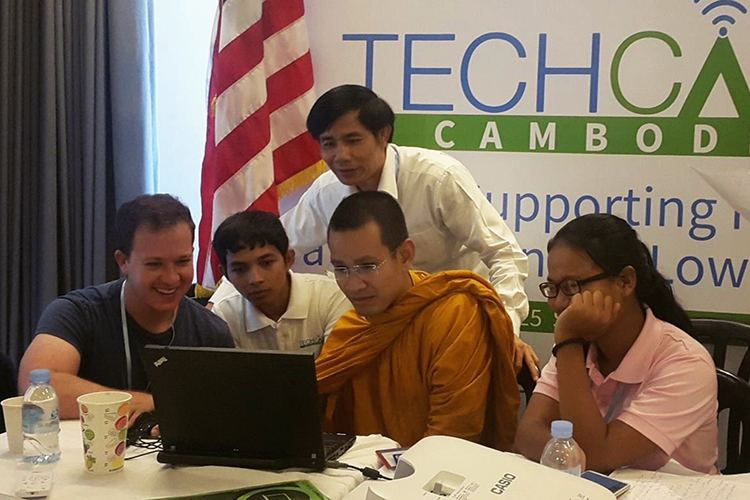
(Photo courtesy of Alex Budak)
As a faculty member, do you think Berkeley can be a unique leader in creating more changemakers?
I think changemaking is baked into the DNA of Berkeley, which is something that I really love. As a top public university, these ideas of questioning the status quo and thinking beyond yourself are things that have been at the core of the Berkeley experience and history. We see this in how the Berkeley Changemaker initiative is taking off campus-wide.
And so, it’s not a hard fit to make changemaking work here. I remember when I first made the pitch to teach the first-ever changemaking class on campus, and I expected maybe there’d be a little bit of pushback. I thought some would say, “Oh, that doesn’t sound like a business school class.”
But to my surprise and delight, they were completely open to it.
So, I think the fact that the course has resonated from Day One shows that this is a place where changemaking is not just welcomed — it’s encouraged.
I’m happy to be part of that legacy, and I’m grateful that they took a risk on me.